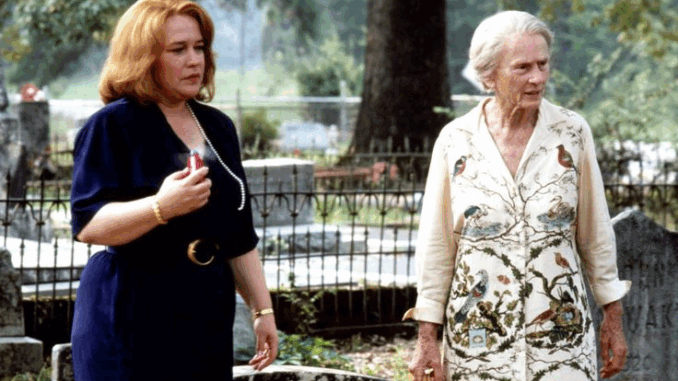
In a film rich with laughter, storytelling, and emotional dialogue, some of the most powerful moments in Fried Green Tomatoes come from what’s left unsaid. Beneath its Southern charm and gentle pace lies a profound meditation on silence — how it protects, wounds, connects, and heals.
While words are essential to the film’s narrative structure (especially through Ninny’s vivid stories), silence becomes its emotional undercurrent — speaking volumes about love, grief, fear, and resilience.
Ruth and Idgie: A Love Beyond Words
The relationship between Ruth and Idgie is one of the most emotionally resonant in the film — and yet, neither woman ever directly says “I love you.”
Instead, their love is expressed through:
-
Touches and glances
-
The way Idgie looks after Ruth’s son
-
Ruth’s quiet decision to leave her abusive husband
-
The shared domestic intimacy at the café
By never naming their relationship explicitly, the film mirrors the social constraints of the era, where same-sex love had to live in the shadows. But this silence does not make their bond weaker. It makes it sacred — a private language of care, loyalty, and mutual survival.

Sipsey’s Silent Strength
One of the most overlooked yet crucial characters is Sipsey, the Black caretaker and cook at the café. She is not given long monologues or tearful scenes. Her power lies in her presence, her knowing glances, her quiet protection of those she loves.
And when the story reaches its darkest point — the murder of Frank Bennett — it is Sipsey’s action, not her words, that saves the day. She does what needs to be done, then returns to the kitchen. Her silence is not submission; it is strategy, survival, and agency.
Evelyn Couch: Buried Beneath Silence
At the start of the film, Evelyn’s emotional pain is encased in silence. She is constantly spoken over by her husband, ignored by society, and dismissed by everyone around her.
Her transformation begins not with shouting, but with listening — to Ninny’s stories, to her own buried anger, to the quiet voice within her that says, I deserve more.
Even her most iconic moment — smashing the younger woman’s car in the parking lot — is followed by a calm, self-assured delivery:
“Tawanda!”
It’s not rage. It’s release.
Ninny Threadgoode: Stories as an Answer to Silence
Ninny, though talkative, uses her stories to fill the silence of aging and loss. Her husband is gone. Her family scattered. Her home abandoned.
Every tale she tells is an act of resistance against erasure. In a nursing home where so many voices are forgotten, her voice builds a world — and gives Evelyn the tools to rebuild her own.
Ironically, it is only through speech that Ninny is able to protect the silences of others. She never pushes Evelyn too far. She never explicitly says whether she is Idgie. She respects the gaps in the story, leaving them open for the viewer to wonder.
Silence as Trauma — and as Healing
The film also acknowledges that silence can be dangerous. Ruth suffers in silence under Frank’s abuse. Big George lives under the oppressive silence of racism. These are silences that harm — that eat away at the soul.
But when silence is chosen — when it becomes a space for reflection, safety, or connection — it turns into a force of healing.
The film ends not with a triumphant speech, but with a quiet, almost magical realization:
“I think she really was Idgie.”
It’s not confirmation. It’s wonder.
A mystery preserved — a silence honored.
What We Don’t Say
Fried Green Tomatoes invites us to listen not just to its dialogue, but to its pauses, glances, and absences.
It reminds us that in life, the most important feelings are often not shouted or spoken, but shown — through care, gesture, sacrifice, and memory.
In honoring silence, the film gives voice to everyone who’s ever had to hide their love, bury their pain, or fight for dignity without making a sound.
